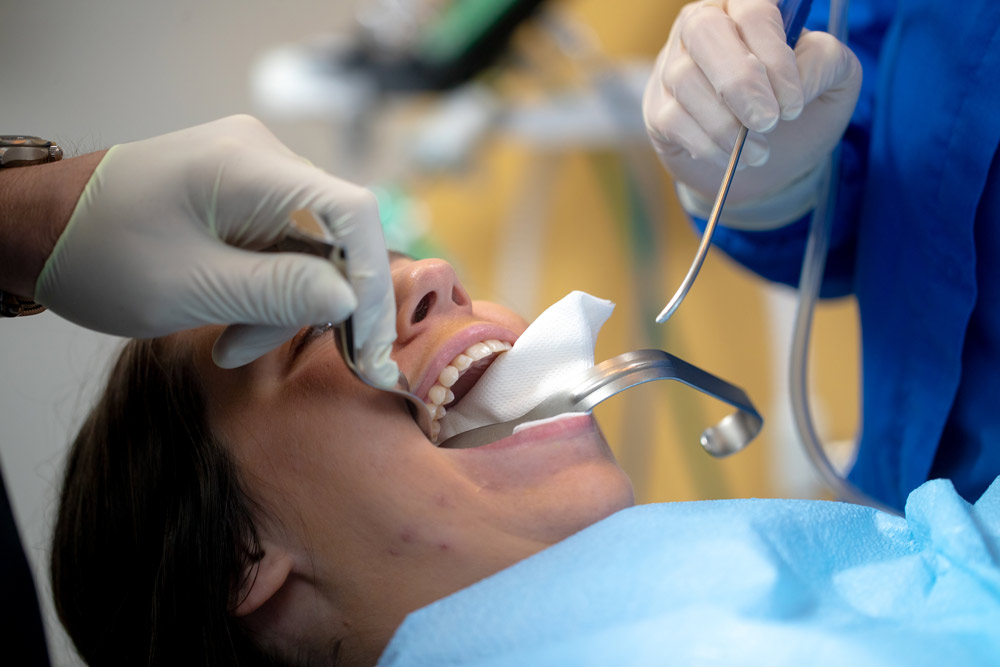If a person faces problems such as severe pain, infection and swelling at the end of his mouth, if his teeth are healthy, it can be a reason for the presence of wisdom teeth. For an accurate diagnosis at this stage, you should go to the dentist and do the initial examinations and photography.

Advantages of wisdom tooth surgery
Prevent gum infection
Prevention of dental cysts and abscesses
Elimination of bad breath
Facilitating teeth cleaning
Expediting dental orthodontic treatment
Wisdom tooth problems
Pain and swelling in the gums
Tooth decay
Applying pressure to other teeth
Sudden misalignment of other teeth
Infection of other parts of the body and fever
Common questions
01. How long does wisdom tooth surgery take?
If you have a question about how long wisdom tooth surgery takes. First of all, you should know that the length of surgery varies according to individual conditions. Because some wisdom teeth do not even need to be extracted. It is very important to consult a doctor before the operation. If the wisdom tooth causes various problems in the mouth such as pain and inflammation, surgery should be considered. There are two different situations in the wisdom tooth extraction process. In some patients, the wisdom teeth grow naturally, while in some patients, the wisdom teeth remain dormant. In both cases, the procedure to be done is different, but wisdom tooth surgery can usually be done in a very short time. Wisdom tooth surgery takes an average of 15 minutes.
02. How is the recovery process after wisdom tooth surgery?
In the first 24 hours after the operation, chewing food with the operated area should not be done. It is also very important to take care of the extracted tooth area after tooth extraction. Manipulation of the wound site can cause infection, pain or bleeding. Smoking during the healing period may prevent wound healing and increase bleeding. Therefore, smoking should be avoided until the wound is completely healed. Spitting can dislodge the clot and cause further bleeding. This is why it is so important not to spit when the surgery is over. If sutures are applied during the operation, attention should be paid to the cleanliness of the surgical areas. While brushing, avoid hard movements that can damage the stitches. If it is not stitched, the stitch should be made using tampon gauze.
03. How many wisdom teeth do we have?
A wisdom tooth is a tooth located at the back of the mouth. The most common age for wisdom tooth eruption is between 17 and 19 years old. An average adult has four wisdom teeth in the mouth. However, some people can have fewer wisdom teeth and some people can have none! It is estimated that 20-25% of people worldwide have less than four wisdom teeth. Therefore, one out of every 4 people probably has less than four wisdom teeth. There is not always enough space for wisdom teeth to grow. Most people experience pain, discomfort or infection from wisdom teeth.
04. How to understand that the wisdom tooth has grown?
There are 3 molars in our mouth on both sides of the jaw area. The last molar tooth is the wisdom tooth. There are 4 wisdom teeth in the mouth. If you feel pain in the back of the jaw and difficulty in opening and closing the jaw, you should definitely see a dentist. Your dentist will determine the way your teeth erupt and the limitations in your jaw along with radiographic methods. After the diagnosis, the doctor will prepare a treatment plan for you.
05. What problems do wisdom teeth cause?
If you experience conditions such as limited space in your jaw and you cannot pay enough attention to your oral and dental health, inflammation of your teeth may be inevitable. Because wisdom teeth are places where excess food accumulates, decay may occur if not taken care of properly. These cavities also cause bad breath.
06. Is wisdom tooth extraction mandatory?
Removing wisdom teeth is not mandatory! But as long as this tooth does not cause oral and dental problems. Wisdom teeth should be protected like other teeth and organs. If the wisdom tooth has not yet come out and puts pressure on other teeth, it can cause tooth decay and crookedness due to compression.
07. Does wisdom tooth surgery cause pain?
There is a common belief that wisdom teeth cause pain and worse, the process of removing them is even more painful. For this reason, most patients are afraid when they are told that we have to pull wisdom teeth. Wisdom tooth extraction by an experienced dentist is generally a quick and painless procedure. Before starting any procedure, we always make sure the area is completely numb so you don't feel any discomfort. Typically, all you may feel is a slight pressure as the tooth is gently rocked back and forth, but at no point should you feel pain. Even in cases where it may be necessary to cut the gums and suture the gums, patients should not feel uncomfortable. In fact, wisdom tooth surgery only takes a few minutes. Wisdom teeth, which are more difficult to remove, usually take 20 to 40 minutes.








